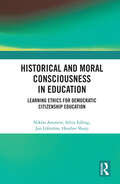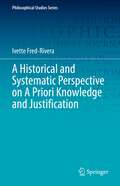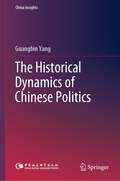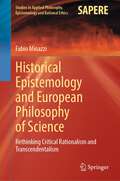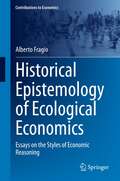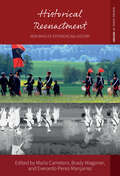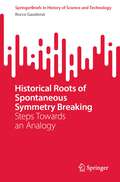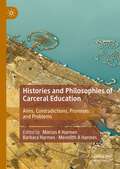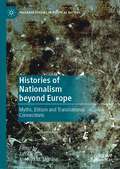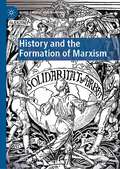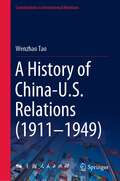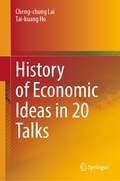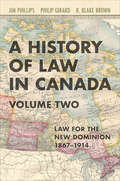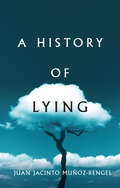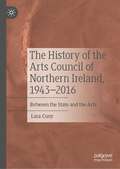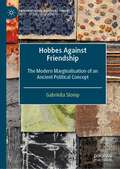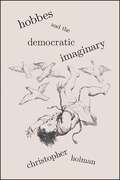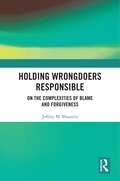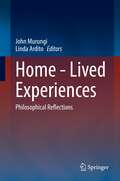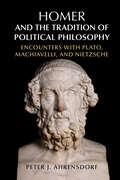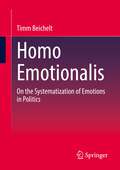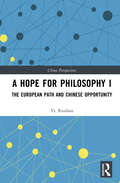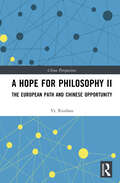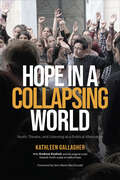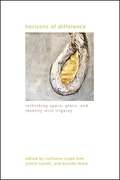- Table View
- List View
Historical and Moral Consciousness in Education: Learning Ethics for Democratic Citizenship Education
by Niklas Ammert Silvia Edling Jan Löfström Heather SharpHistorical and Moral Consciousness highlights how ethics can be understood in the context of History education. It analyses the qualitative differences in how young people respond to historical and moral dilemmas of relevance to democratic values and human rights education. Drawing on a four-year international project, the book offers nuanced discussion and new scholarly understanding of the intersections between historical consciousness and moral consciousness within research. It develops new theoretical tools for history teaching and learning that can support teachers as they endeavor to educate for democratic citizenship. The book includes a meta-analysis of research within history Didaktik and around historical events with a moral bearing, and presents a comparative study of Australian, Finnish, and Swedish high school students’ moral understandings of historical dilemmas. Raising important questions about how our learning from the past is intertwined with our present and future interpretations and judgements, this book will be of great interest to academics, scholars, teachers, and post graduate students in the fields of history education, democratic education, human rights education, and citizenship education.
A Historical and Systematic Perspective on A Priori Knowledge and Justification (Philosophical Studies Series #151)
by Ivette Fred-RiveraThis book provides a detailed and comprehensive account of the problem of a priori knowledge from a historical as well as a systematic perspective. The author explores Kant’s views in connection with the possibility of revision, something hardly, if at all, done in philosophical literature. Furthermore, the views of well-renowned philosophers such as Quine, Putnam, Kitcher, and Hale are discussed in detail and are put into a historical and systematic perspective. Finally, this book contains a glossary of important notions offering illuminating accounts of a priori knowledge and related notions and explains the relationship between a priori knowledge, fallibility and revision. The detailing of concepts such as ‘defeasibility’, ‘infallibility’, ‘falsifiability’ helps anyone reading philosophical literature to pin down the meaning of the terms and its implications in this context. The enriched and dual approach the author takes makes the book a very useful and lucid guide to the problem of a priori knowledge.
The Historical Dynamics of Chinese Politics (China Insights)
by Guangbin YangThis book puts forward a new perspective, the historical dynamics of Chinese politics, for better understanding China’s politics, which is from the vertical history of China and the dimension of horizontal world politics, combining the historical analysis of how Chinese politics has come along the way and the comparative analysis of China's governance achievements in world politics. Based on this premise, this book attempts to explain the democratic discourse of contemporary Chinese political logic. The historical dynamics of Chinese politics comes from long-term communication between the author and Western scholars, which may help the global audience to understand China’s politics from all angles.
Historical Epistemology and European Philosophy of Science: Rethinking Critical Rationalism and Transcendentalism (Studies in Applied Philosophy, Epistemology and Rational Ethics #62)
by Fabio MinazziThis book offers a comprehensive analysis on the evolution of philosophy of science, with a special emphasis on the European tradition of the twentieth century. At first, it shows how the epistemological problem of the objectivity of knowledge and axiomatic knowledge have been previously tackled by transcendentalism, critical rationalism and hermeneutics. In turn, it analyses the axiological dimension of scientific research, moving from traditional model of science and of scientific methods, to the construction of a new image of knowledge that leverages the philosophical tradition of the Milan School. Using this historical-epistemological approach, the author rethinks the Kantian Transcendental, showing how it could be better integrated in the current philosophy of science, to answer important questions such as the relationship between science and history, scientific and social perspectives and philosophy and technology, among others. Not only this book provides a comprehensive study of the evolution of European Philosophy of Science in the twentieth century, yet it offers a new, historical and epistemological-based approach, that could be used to answers many urgent questions of contemporary societies.
Historical Epistemology of Ecological Economics: Essays on the Styles of Economic Reasoning (Contributions to Economics)
by Alberto FragioThis volume uses historical epistemology in order to address several topics in the history of economic thought, with special emphasis on ecological economics, environmental metaphors of scarcity, and mathematical ecology. Using the field of ecological economics as an anchor point, the author reflects on the styles of reasoning in economics with a view towards understanding the nature of disagreement that stems from a failure of communication between rival approaches in economics. A thorough inquiry into issues related to identity, coherence, pluralism, and reception, this volume will appeal to researchers and students interested in history of economic thought, ecological economics, and philosophy of the sciences.
Historical Reenactment: New Ways of Experiencing History (Making Sense of History #44)
by Mario Carretero, Brady Wagoner, and Everardo Perez-ManjarrezLong dismissed as the domain of hobbyists and obsessives, historical reenactment—the dramatization of past events using costumed actors and historical props—has only in recent years attracted serious attention from scholars. Drawing on examples from around the world, Historical Reenactment offers a fascinating, interdisciplinary exploration of this cultural phenomenon. With particular attention to reenactment’s social and pedagogical dimensions, it develops a robust definition of what the practice constitutes, considers what methodological approaches are most appropriate, and places it alongside museums and memorial sites as an object of analysis.
Historical Roots of Spontaneous Symmetry Breaking: Steps Towards an Analogy (SpringerBriefs in History of Science and Technology)
by Rocco GaudenziWhat are the thinking processes and knowledge resources involved in a complex discovery? How can the physics of solids, the physics of nuclei, and elementary particle physics cross-fertilise in spite of the widely differing domains and energy scales they deal with? This book addresses the questions by reconstructing and examining from the historical epistemological perspective the fascinating heuristic path to the concept of spontaneous symmetry breaking. This analysis especially brings to light the role that analogical reasoning and mathematical reformulations played in the discovery process, as well as the influence of the Japanese milieu and approach to physical problems.
Histories and Philosophies of Carceral Education: Aims, Contradictions, Promises and Problems
by Marcus K Harmes Barbara Harmes Meredith A HarmesThis edited collection encourages philosophical exploration of the nature, aims, contradictions, promises and problems of the practice of education within prisons around the world. Such exploration is particularly necessary given the complex operational barriers to education, and higher education in particular, within prison-based teaching and learning. These operational barriers are matched by cultural and polemical barriers, such as the criticism of diverting resources to and spending money on prisoner education when the cost of some education seems prohibitive for people outside prison. More so than in other education contexts, prison education may fall short of higher ideals because it is shot through with both practical and moral-political problems and challenges, especially in the age of global late capitalism, high technology and mass incarceration or securitization. This book includes insights and issues around a wide range of areas including: ethics, religion, sociology, justice, identity and political and moral philosophy.
Histories of Nationalism beyond Europe: Myths, Elitism and Transnational Connections (Palgrave Studies in Political History)
by Jan Záhořík Antonio M. MoroneThis edited collection explores varying shapes of nationalism in different regional and historical settings in order to analyse the important role that nationalism has played in shaping the contemporary world. Taking a global approach, the collection includes case studies from the Middle East, Africa, Asia and North America. Unique not only in its wide range of geographically diverse case studies, this book is also innovative due to its comparative approach that combines different perspectives on how nations have been understood and how they came into being, highlighting the transnational connections between various countries. The authors examine what is meant by the concepts of ‘nation’ and ‘national identity,’ discussing themes such as citizenship, ethnicity, historical symbols and the role of elites. By exploring these entangled categories of nationalism, the authors argue that throughout history, elites have created ‘artificial ’ versions of nationalism through symbolism and mythology, which has led to nationalism being understood through social constructivist or primordialist lenses. This diverse collection will appeal to researchers studying nationalism, including historians, political scientists and anthropologists.
History and the Formation of Marxism (Marx, Engels, and Marxisms)
by Bertel NygaardThis book redefines the relationship between Marxism and history. At its roots, Marxism was aimed at analyzing society in order to change it, reflecting on the past to create the ‘poetry of the future.’ No single event of the past was as important to early Marxists as the French Revolution of 1789. Studying the varying uses of the history of that past event among Karl Marx, Friedrich Engels, and prominent European Marxists before 1914 (Karl Kautsky, V.I. Lenin, and others), this book argues that we should take the historiography of concrete past events seriously. It was not only an auxiliary element of Marxism, but a core constitutive element in its formation. Thus, this book calls for transcending traditional approaches to Marxism as a fixed set of social theories combined with strategies for the present and future. Important to students of Marxism, the labor movement, and the French Revolution alike, this study contains refreshing perspectives on the interplay between past, present, and future and on the role of states, social classes, socio-economic determination, and political organization in history.
A History of China-U.S. Relations (Contributions to International Relations)
by Wenzhao TaoThis book contains the history of China-U.S. Relations (1911–1949), including China-US relations in Early Republican Period, the impact of Versailles Peace Conference and Washington Conference on China-US relations, US support for Northern Warlord Government, the Guangzhou Revolutionary Government, and the Nanjing National Government. During the War of Resistance Against Japanese Aggression, the United States went from neutral to form an alliance with China against Japan. After the end of the War, China and the United States gradually moved toward confrontation. This book also has a brief description of China-US relations from 1784 to 1911.
History of Economic Ideas in 20 Talks
by Cheng-chung Lai Tai-kuang HoThis book provides a concise history of economic thought for readers of all ages. While some basic economics knowledge would be helpful, it is not required. The book sets out to achieve three aims: to be interesting, entertaining, and thought-provoking. While the authors may appear opinionated in certain instances, this is intentionally done in order to alert readers to form their own views. History of ideas does not make the us smarter nor richer, but it can reduce our ignorance and the “banality of evil”—a term Hannah Arendt referred to people who lack self-reflection, “He did his duty...; he not only obeyed orders, he also obeyed the law.”
A History of Law in Canada, Volume Two: Law for a New Dominion, 1867–1914 (Osgoode Society for Canadian Legal History)
by Jim Phillips Philip Girard R. Blake BrownThis is the second of three volumes in an important collection that recounts the sweeping history of law in Canada. The period covered in this volume witnessed both continuity and change in the relationships among law, society, Indigenous peoples, and white settlers. The authors explore how law was as important to the building of a new urban industrial nation as it had been to the establishment of colonies of agricultural settlement and resource exploitation. The book addresses the most important developments in the seventeenth, eighteenth, and nineteenth centuries, including legal pluralism and the co-existence of European and Indigenous law. It pays particular attention to the Métis and the Red River Resistance, the Indian Act, and the origins and expansion of residential schools in Canada. The book is divided into four parts: the law and legal institutions; Indigenous peoples and Dominion law; capital, labour, and criminal justice; and those less favoured by the law. A History of Law in Canada examines law as a dynamic process, shaped by and affecting other histories over the long term.
A History of Lying
by Juan Jacinto Muñoz-RengelWherever there is life, there are lies. Slick-suited politicians lie on the podium, ready to tell voters what they want to hear. Cheating lovers, swindling businessmen, double-crossing villains – all liars. But nature lies too – the cheetah crouching in the tall grass waiting to pounce, its spots and straw-coloured fur blending in with its surroundings, the chameleon with its adaptable skin, the octopus hiding in its cave. Juan Jacinto Muñoz-Rengel uncovers the slippery history of lies, some dark and elusive, others thunderous and dazzling. From primeval forests to modern politics, he explores the uncomfortable truths of our white lies, fudged facts and blatant deceptions. For centuries, philosophers, writers and poets have grappled with the paradox of what&’s fact and what&’s fiction. So who can we really believe? Our friends? Our partners? Our leaders? Can we even trust ourselves? Truly, this is the only book in which the abundance of lies on its pages is a sign of success. Or maybe it isn&’t. Who can really tell?
The History of the Arts Council of Northern Ireland, 1943–2016: Between the State and the Arts
by Lara CunyThis book presents the history of the Council for the Encouragement of Music and the Arts (CEMA) in Northern Ireland from its conception in 1943, and its successor organisation, the Arts Council of Northern Ireland (ACNI). Exploring the political and social impact of cultural policy in Northern Ireland, the book illustrates how the arts developed during the twentieth century and sheds light on the relationship between politics and culture. The author takes a closer look at the responsibilities of ACNI, and examines its interaction with the unionist government, which sought to influence how the organisation distributed its grants. Spanning the outbreak of the Troubles in the 1960s and the Peace Process in the 1990s, the ACNI evolved through a period of conflict and change, and therefore this book argues that there was an undeniable link between the changing political environment and the management of the arts in Northern Ireland. The arm’s length principle is analysed in relation to ACNI, examining the influence that the state had upon its management and governance. Offering a unique historical overview of the arts in Northern Ireland, this interdisciplinary book fills a gap in Irish history and presents insights into cultural policy, conflict resolution and political history.
Hobbes Against Friendship: The Modern Marginalisation of an Ancient Political Concept (International Political Theory)
by Gabriella SlompThis book explores why and how Thomas Hobbes – the 17th century founder of political science -- contributed to the modern marginalisation of ‘friendship’, a concept that stood in the foreground of ancient moral and political thought and that is currently undergoing a revival. The study shows that Hobbes did not question the occurrence of friendship; rather, he rejected friendship as an explanatory and normative principle of peace and cooperation. Hobbes’s stance was influential because it captured the spirit of modernity- its individualism, nominalism, practical scepticism, and materialism. Hobbes’s legacy has a bearing on contemporary debates about civic, international and global friendship.
Hobbes and the Democratic Imaginary: Hobbes And The Democratic Imaginary
by Christopher HolmanAt a time when nearly all political actors and observers—despite the nature of their normative commitments—morally appeal to the language of democracy, the particular signification of the term has become obscured. Hobbes and the Democratic Imaginary argues that critical engagement with various elements of the work of Hobbes, a notorious critic of democracy, can deepen our understanding of the problems, stakes, and ethics of democratic life. Firstly, Hobbes's descriptive anatomy of democratic sovereignty reveals what is essential to the institution of this form of government, in the face of the conceptual confusion that characterizes the contemporary deployment of democratic terminology. Secondly, Hobbes's critique of the mechanics of democracy points toward certain fundamental political risks that are internal to its mode of operation. And thirdly, contrary to Hobbes's own intentions, Christopher Holman shows how the selective redeployment of certain Hobbesian categories could help construct a normative ground in which democracy is the ethical choice in relation to other sovereign forms.
Holding Wrongdoers Responsible: On the Complexities of Blame and Forgiveness
by Jeffrey M BlusteinHolding Wrongdoers Responsible contests a number of widely accepted claims about blame and forgiveness that are insufficiently examined in the philosophical literature, and their relationship to each other. These claims are: i Anger is the most fitting kind of blame for those who are guilty of wrongdoing.ii Culpable wrongdoers should be blamed for what they have done.iii Forgiving consists of renouncing blame and blame feelings, especially angry ones.iv Forgiving is a kind and compassionate act for which a wrongdoer should be grateful. Against (i), the book argues that there are a number of reasons why we should be skeptical about the singular importance given to anger in this connection; against (ii), that blame is just one possible response to wrongdoing and, like other responses, has to be evaluated in relation to its purposes and the available alternatives; against (iii), that the continuation of blame after forgiveness is neither conceptually nor morally ruled out; and against (iv), that the image of forgiveness as benevolent and gift-like belies its dark side. By contesting these claims, the book reveals some of the moral and psychological complexities of these phenomena.
Home - Lived Experiences: Philosophical Reflections
by John Murungi Linda ArditoThis book explores the lived experience of being at home as well as being homeless. Being at home or not is typically a matter of being at a place or not, where such a place is carved out of space and designated as such. It is a place that is both empirical and trans-empirical. When one is at home or not at home, one typically has in mind an inhabited place. To inhabit or not to inhabit it is to find oneself in a place that has an affective presence or absence. In either case, affectivity points to a lived place where lived experience is constituted and displayed. Thus, in this context, affectivity becomes more than the subject of empirical psychology. If psychology were to have access, it would be in the context of phenomenological or existential psychology – a psychology that has its roots in the sensible world and, hence, a psychology that expresses an aesthetic dimension. Each of the contributors in this book extends an invitation to the readers to participate in constituting, extending, and sharing with others the sense of either being at home or of being homeless. This book appeals to students, researchers as well as general interest readers.
Homer and the Tradition of Political Philosophy: Encounters with Plato, Machiavelli, and Nietzsche
by Peter J. AhrensdorfIn this book, Peter Ahrensdorf explores an overlooked but crucial role that Homer played in the thought of Plato, Machiavelli, and Nietzsche concerning, notably, the relationship between politics, religion, and philosophy; and in their debates about human nature, morality, the proper education for human excellence, and the best way of life. By studying Homer in conjunction with these three political philosophers, Ahrensdorf demonstrates that Homer was himself a philosophical thinker and educator. He presents the full force of Plato's critique of Homer and the paramount significance of Plato's achievement in winning honor for philosophy. Ahrensdorf also makes possible an appreciation of the powerful concerns expressed by Machiavelli and Nietzsche regarding that achievement. By uncovering and bringing to life the rich philosophic conversation among these four foundational thinkers, Ahrensdorf shows that there are many ways of living a philosophic life. His book broadens and deepens our understanding of what a philosopher is.
Homo Emotionalis: On the Systematization of Emotions in Politics
by Timm BeicheltIn this book, important works and approaches of policy-oriented emotion research are brought into a systematic context. For this purpose, three different types of emotions are elaborated, which in their totality constitute Homo Emotionalis: binary emotions, basic emotions, reflexive emotions. They correspond to individual-psychological stages of development, but are also relevant in the social and political handling of emotions. The interplay of emotion types and social constellations leads to different modes of political action, which shape different forms of emotional politics. In each case, individual logics emerge along which emotional politics is pursued. With its interdisciplinary focus, this volume is aimed at political scientists, anthropologists, sociologists and social psychologists.
A Hope for Philosophy I: The European Path and Chinese Opportunity (China Perspectives)
by Ye XiushanAs the final work by Ye Xiushan, one of the most famous philosophers and philosophy scholars in China, this two-volume title scrutinizes the historical development of both Chinese and Western philosophies, aiming to explore the convergence between the two philosophical traditions.Combining the historical examination and argumentation based on philosophical problematics, the two-volume set expounds the key figures and schools and critical thoughts in both Western and Chinese philosophical histories. In this first volume, the author investigates the intellectual heritage of ancient Greece and Thales of Miletus as the cradle of European philosophy, freedom in Greek philosophy, reason and negation in classical German philosophy, and the relationship between epistemology and ontology in the philosophical history, thereby illuminating the core spirit of Western philosophy and theoretical quandary facing the contemporary European philosophy.This title will appeal to scholars, students, and general readers interested in philosophical history, comparative philosophy, Chinese philosophy, and Western philosophy ranging over Greek philosophy, German classic philosophy, and contemporary continental philosophy.
A Hope for Philosophy II: The European Path and Chinese Opportunity (China Perspectives)
by Ye XiushanAs the final work by Ye Xiushan, one of the most famous philosophers and philosophy scholars in China, this two-volume title scrutinizes the historical development of both Chinese and Western philosophies, aiming to explore the convergence between the two philosophical traditions.Combining the historical examination and argumentation based on philosophical problematics, the two-volume set expounds the key figures and schools and critical thoughts in both Western and Chinese philosophical histories. The second volume retraces the origin and development of Chinese philosophy and reveals its focal grounds, i.e. a trinity of man, Heaven, and earth, which helps explain why and how it diverges from Western way of philosophizing. This book also delineates the diachronic transitions of Chinese philosophy that critically embrace different schools of thought throughout history, including Confucianism, Daoism, Buddhism, and Marxism, etc., and then constitutes an organic whole. To elicit the potential for a new transformation of contemporary Chinese philosophy, the author encourages a constructive dialogue between the Chinese and Western philosophies.This title will appeal to scholars, students, and general readers interested in philosophical history, comparative philosophy, Chinese philosophy, and Western philosophy ranging over Greek philosophy, German classic philosophy, and contemporary continental philosophy.
Hope in a Collapsing World: Youth, Theatre, and Listening as a Political Alternative
by Kathleen GallagherFor young people, the space of the drama classroom can be a space for deep learning as they struggle across difference to create something together with common purpose. Collaborating across institutions, theatres, and community spaces, the research in Hope in a Collapsing World mobilizes theatre to build its methodology and create new data with young people as they seek the language of performance to communicate their worries, fears, and dreams to a global network of researchers and a wider public. A collaboration between a social scientist and a playwright and using both ethnographic study and playwriting, Hope in a Collapsing World represents a groundbreaking hybrid format of research text and original script – titled Towards Youth: A Play on Radical Hope – for reading, experimentation, and performance.
Horizons of Difference: Rethinking Space, Place, and Identity with Irigaray (SUNY series in Gender Theory)
by Ruthanne Crapo Kim; Yvette Russell; Brenda SharpHorizons of Difference offers twelve original essays inspired by Luce Irigaray's complex, nuanced critique of Western philosophy, culture, and metaphysics, and her call to rethink our relationship to ourselves and the world through sexuate difference. Contributors engage urgent topics in a range of fields, including trans feminist theory, feminist legal theory, film studies, critical race theory, social-political theory, philosophy of religion, environmental ethics, philosophical aesthetics, and critical pedagogy. In so doing, they aim to push the scope of Irigaray's work beyond its horizon. Horizons of Difference seeks conversations that Irigaray herself has yet to fully consider and explores areas that stretch the limits of the notion of sexuate difference itself. Sexuate difference is a unifying mode of thought, bringing disparate disciplines and groups together. Yet it also resists unification in demanding that we continually rethink the basic coordinates of space, place, and identity. Ultimately, Horizons of Difference insists that the fragmented, wounded subjectivities within the dominant regime of masculine sameness can inform how we negotiate space, find place, and transform identity.
